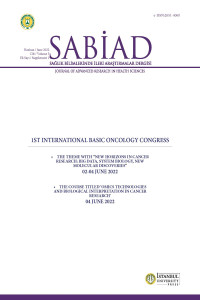Abstract
The human body is an intricate complex containing an estimated three trillion Mo members alongside its own cells and genes. Host-microbiome interactions in many parts of the body comprehensively govern multiple physiological processes and various multifactorial disease conditions. In the last decade, with advances in next-generation sequencing, the study of the human microbiome in oncology has become a rapidly developing and interesting field. It has been suggested that microbiome communities influence the development, progression, metastasis formation, and treatment response of multiple cancer types. Understanding the molecular mechanisms of such cancer-modulating interactions and the effects on cancer therapy is considered of great scientific and clinical importance. Although causal evidence of microbial effects on cancer biology is beginning to emerge and the microbiome can enable the development of new cancer-related diagnoses and treatments, little is still known. Microbes and microbiota contribute to carcinogenesis through multiple mechanisms. Specially, microbiome-cancer modulation is driven by a host-microbe interactions such as contact-dependent, contactindependent, and immunological mechanisms, by altering the balance of host cell proliferation and death, and influencing the immune system functions, the metabolism of host-produced factors, and the formation of microbial products. Beyond the gut, the tumor-associated microbial communities, located in the tumor, tumor microenvironment, and other part of the body, can interact with the tumor cells, immune cells, and tumor microenvironment, subsequently leading to cancer progression and treatment outcome. However, there is still a great need for standardization of the methodology and the quality control in microbiome studies, alongside further translational studies.
References
- Grozescu T, Popa F. Prostate cancer between prognosis and adequate/proper therapy. J Med Life. 2017;10(1):5-12.
Abstract
The human body is an intricate complex containing an estimated three trillion Mo members alongside its own cells and genes. Host-microbiome
interactions in many parts of the body comprehensively govern multiple physiological processes and various multifactorial disease conditions. In the last
decade, with advances in next-generation sequencing, the study of the human microbiome in oncology has become a rapidly developing and interesting
field. It has been suggested that microbiome communities influence the development, progression, metastasis formation, and treatment response of
multiple cancer types. Understanding the molecular mechanisms of such cancer-modulating interactions and the effects on cancer therapy is considered
of great scientific and clinical importance. Although causal evidence of microbial effects on cancer biology is beginning to emerge and the microbiome can
enable the development of new cancer-related diagnoses and treatments, little is still known. Microbes and microbiota contribute to carcinogenesis
through multiple mechanisms. Specially, microbiome-cancer modulation is driven by a host-microbe interactions such as contact-dependent, contactindependent,
and immunological mechanisms, by altering the balance of host cell proliferation and death, and influencing the immune system functions,
the metabolism of host-produced factors, and the formation of microbial products. Beyond the gut, the tumor-associated microbial communities, located
in the tumor, tumor microenvironment, and other part of the body, can interact with the tumor cells, immune cells, and tumor microenvironment,
subsequently leading to cancer progression and treatment outcome. However, there is still a great need for standardization of the methodology and the
quality control in microbiome studies, alongside further translational studies.
References
- Grozescu T, Popa F. Prostate cancer between prognosis and adequate/proper therapy. J Med Life. 2017;10(1):5-12.
Details
| Primary Language | English |
|---|---|
| Subjects | Clinical Sciences |
| Journal Section | Meeting Abstract |
| Authors | |
| Publication Date | August 9, 2022 |
| Submission Date | June 27, 2022 |
| Published in Issue | Year 2022 Volume: 5 Issue: S-1 |


